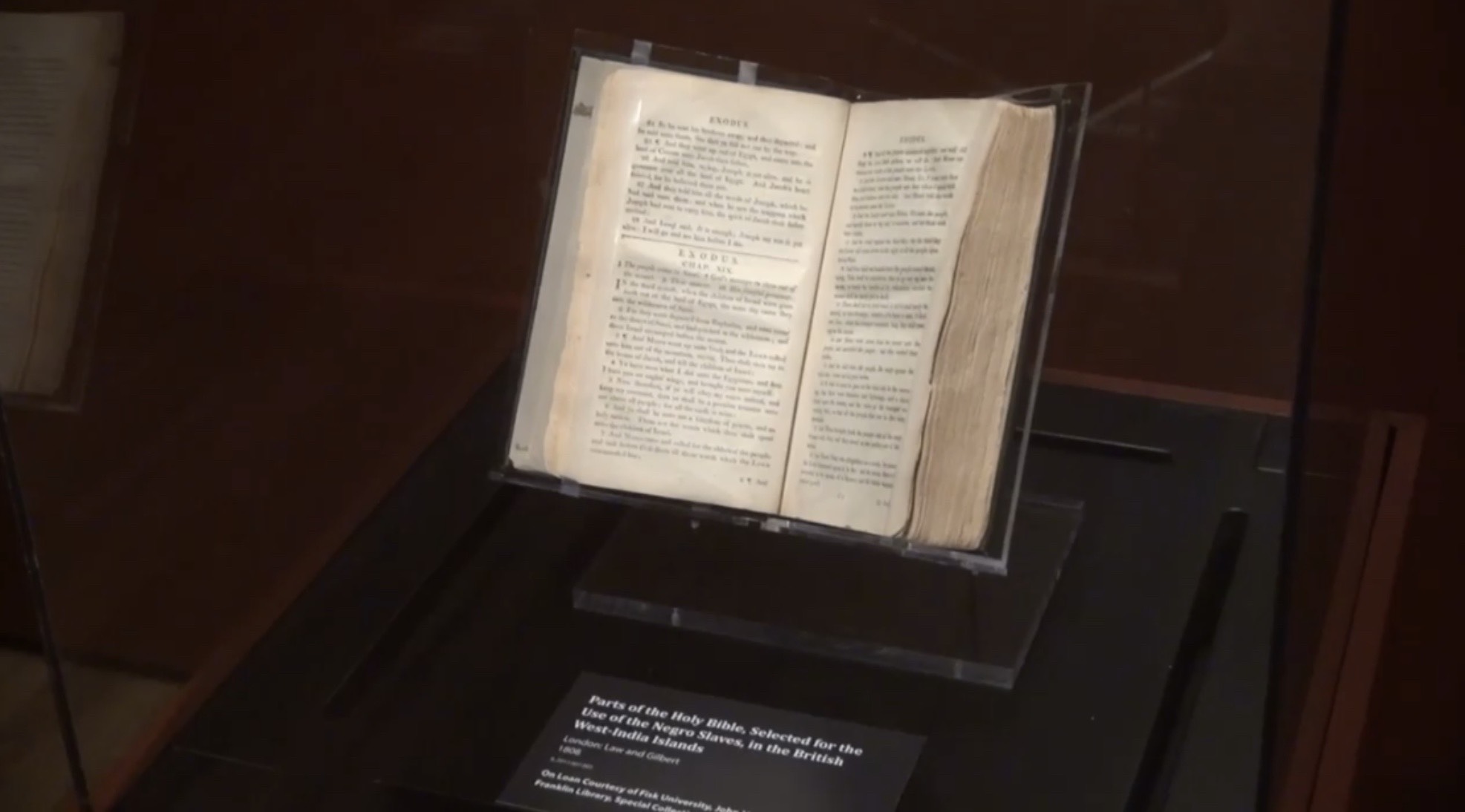The Slave Bible: Editing the Word of God

D.C. is home to a variety of museums, but the latest addition, the Museum of the Bible, is a little different from the rest.
The one-year-old museum is home to a variety of exhibits – ancient Cannanite pottery, artifacts from Jerusalem and some experiences tailored toward families. There is an indoor “ride” experience that flies you over religious symbolism in DC and an immersive theatre that tells Bible stories in a unique way.
But the newest exhibit is an “artifact in focus”, a display built around a single item on loan from Fisk University. Unsurprisingly, the artifact is a Bible. Perhaps more surprisingly, it’s not a Bible belonging to anyone famous. Instead, it’s a version from the early 1800s that was used to convert slaves in the Caribbean.
Except this “Slave Bible”, as it is called, has been selectively edited to remove all references that paint slavery in a bad light, while including those that seem to justify or glorify slavery. These decisions were made in order to discourage a slave uprising.
For example, according to Seth Pollinger, director of museum curatorial at the Museum of the Bible, almost all of the book of Exodus is omitted from the Slave Bible. Moses telling Pharaoh “Let my people go” is cut, while the story of the Ten Commandments remains. The entire book of Revelations was also cut because the story as seen as one of “overcoming” which might inspire some slaves to take action against their masters. 90 percent of the Old Testament and nearly half of the New Testament is missing from the Slave Bible.
Meanwhile, verses that encourage slaves to be obedient remain. So do stories like that of Joseph’s brothers selling him into slavery.
According to Pollinger, only two other copies of this Bible exist that we know of. It also was not used in the United States.
It is important to note that this Bible was only used by a select group of missionaries. Most missionaries were teaching slaves about Christianity with complete Bibles.
A large portion of the exhibit is dedicated to visitors’ responses. The Museum seems to understand that this lesser-known artifact could lead to all sorts of discussions on religion, history and race.
Interpretations of religious texts have routinely been used to oppress groups throughout history and are still an important tool for various political movements throughout the world. It seems that as long as there is religion, there will be political controversy surrounding it.
But this Slave Bible goes a step deeper than that. It is not simply the case that some missionaries used Bibles to justify slavery. They explicitly omitted portions of the book that would pose problems for the existing political order in the Americas at the time. With this act, there is a sort of subconscious acknowledgement that supporters of all types of slavery would find little moral justification in scripture, and that the book features several messages of liberation and stories of slaves seeking freedom.
The cognitive dissonance is fascinating. These missionaries’ literal mission, if you will, was to preach about faith from a book that featured messages they did not agree with. If the Bible is intended to be the word of God, what is the justification for editing it?
It is clear here that the missionaries’ aims were tied up with the economic and political goals of those overseeing slaves in the Caribbean. By aligning themselves with a despicable social system, missionaries had to ignore the word of God to spread Christianity.
Is Christianity still Christian if over half the Bible is omitted? This is a theological question but also an ethical one. For while slaves were being taught from one version of the Bible, their masters were aware of another.
Slaves mistakenly thought that by learning from this book, they were sharing knowledge and a religious identity with their masters that helped explain why they were slaves. While it should come as no surprise that people practicing slavery would lie to those they are subjugating, it is easy to imagine it never crossing the minds of the slaves who thought they were learning from well-meaning missionaries. This was their first brush with the religion and they were being duped.
History is full of highly questionable religious motivations for political and societal wrongs, but actions as blatantly hypocritical as these can still come as a surprise. It reminds us of the unfortunate power of cherry-picking, especially when it comes to religious texts. While some verses may seem to provide justification for an action, others may seem to condemn it. This is why it is important to keep religious texts intact, so that their message cannot be blatantly misconstrued by acts of omission.
Even without editing, the Bible has been used to justify slavery, segregation, homophobia, and countless other systems and ideologies meant to exclude or oppress groups of people. It has, of course, inspired countless people to engage in acts of kindness as well. While Americans pride themselves on the country’s freedom of religion, personal religious attitudes will still influence political persuasions, and thus, policymaking. It is important to remember that freedom of religion doesn’t mean that the Bible has had no bearing on our politics. It is an integral part of the history of the Americas and remains influential to this day. It is still used to form moral frameworks and to frame ethical questions. Our interpretations may differ, but as the story of the Slave Bible has shown, religious texts can be used as tools of power – for good or for evil.




